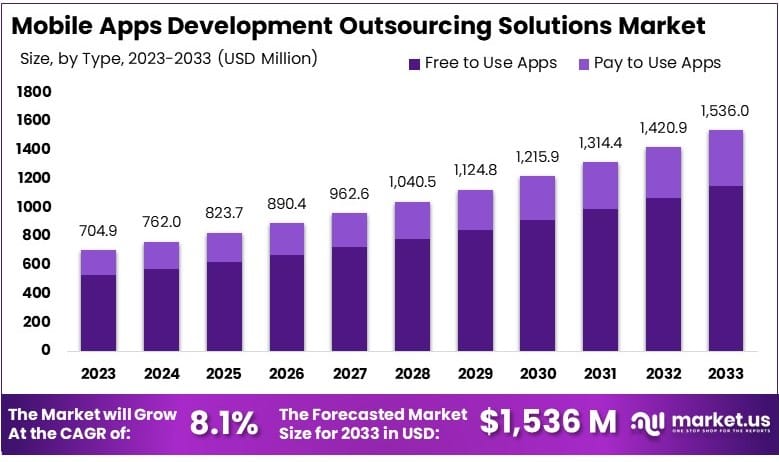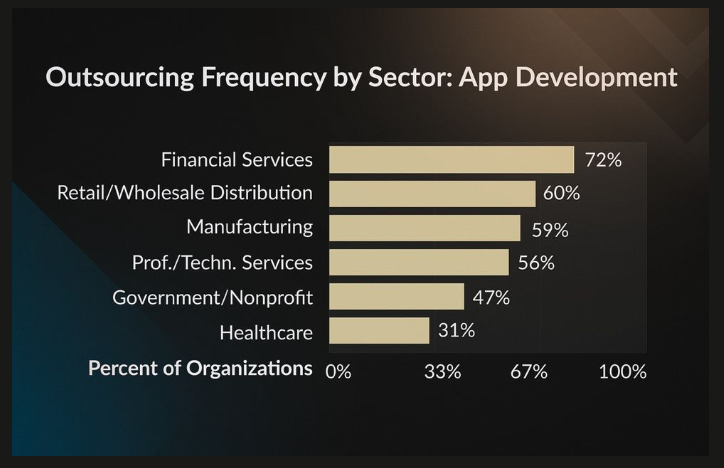Table of Contents
Introduction
According to Market.us, The Mobile Apps Development Outsourcing Solutions Market was valued at USD 704.9 million in 2023 and is expected to reach USD 1,536 million by 2033, growing at a compound annual growth rate (CAGR) of 8.1% over the forecast period. North America currently leads the market, holding a dominant position with a 35% market share, which translates to a market value of USD 246.72 million in 2023. This regional dominance is driven by the high demand for cost-effective and scalable mobile app solutions, alongside the presence of leading technology companies and a mature outsourcing ecosystem.
Mobile app development outsourcing is a process where businesses hire external agencies or freelancers to develop mobile applications for them. This approach is popular because it can be more cost-effective than having an in-house development team. Companies choose to outsource to access a wider range of expertise and to speed up the development process. Outsourcing also allows businesses to focus on their core functions while leaving technical tasks to experts who have the right tools and technologies to build high-quality mobile applications.
The market for mobile apps development outsourcing is growing as more companies look to mobile solutions to enhance their business operations and customer interactions. This growth is driven by the increasing use of smartphones and the need for businesses to be present on mobile platforms without the high costs of maintaining a dedicated app development team. Additionally, the rise of cloud technologies and the growing accessibility of freelance platforms that connect developers with businesses have further facilitated this market’s expansion. Companies in industries such as e-commerce, healthcare, and education are especially active in seeking mobile app development outsourcing services to innovate and improve their service delivery.
Several key factors are driving the growth of the mobile apps development outsourcing market. Firstly, the proliferation of mobile devices and the expanding global internet penetration are making mobile apps an essential component of business strategy. Secondly, the advancement in cloud computing and mobile technologies has made outsourcing more accessible and effective, allowing for seamless collaboration and communication between companies and external developers. Additionally, the economic advantages of outsourcing, such as reduced operational and labor costs, contribute significantly to its increasing popularity.

The demand for mobile apps development outsourcing solutions is robust and growing steadily. As businesses across various sectors increasingly recognize the importance of having a mobile presence, the need for efficient, cost-effective development solutions escalates. This demand is particularly high among small to medium-sized enterprises (SMEs) that may not have the in-house capabilities to develop apps themselves but need to compete in digital spaces dominated by larger corporations with more resources.
The mobile apps development outsourcing market presents numerous opportunities, particularly in emerging technologies such as artificial intelligence (AI), machine learning, and augmented reality (AR). These technologies offer new ways for businesses to engage with users and provide enhanced user experiences. There is also a growing opportunity in developing mobile applications for niche markets and specialized industries, where bespoke solutions can significantly impact operational efficiency and customer satisfaction. Moreover, as more businesses prioritize digital transformation, the demand for outsourced mobile app development is expected to rise, providing ample opportunities for service providers to expand their offerings and reach new markets.
Key Takeaways
- The Mobile Apps Development Outsourcing Solutions Market was valued at USD 704.9 million in 2023 and is expected to grow significantly, reaching a projected value of USD 1,536 million by 2033, with a compound annual growth rate (CAGR) of 8.1% over the forecast period. This growth is driven by the increasing demand for mobile applications across various industries, such as healthcare, retail, and finance, to enhance customer engagement and streamline operations.
- In terms of the type segment, Free to Use Apps dominated in 2023, capturing 75% of the market share. This is largely attributed to the rising popularity of ad-supported apps, which offer users free services while generating revenue through advertising models.
- On the platform segment, Android led the market with a 58% share in 2023, benefiting from its widespread global usage and dominance in mobile operating systems, particularly in emerging markets. Its open-source nature and customizable features make it a popular choice for mobile app development outsourcing.
- North America held the largest regional share of the market in 2023, accounting for 35%. The region’s dominance can be linked to the high demand for mobile app development services in sectors like e-commerce, entertainment, and technology, as well as a strong presence of key market players and advanced infrastructure.
Mobile Apps Development Outsourcing Solutions Statistics
- The Global AI in Mobile Apps Market is projected to reach approximately USD 249.8 billion by 2033, surging from USD 16.7 billion in 2023, with a remarkable CAGR of 33.7% throughout the forecast period of 2024 to 2033.
- Similarly, the Mobile AR Market is expected to achieve a significant market size of USD 472.4 billion by 2033, up from USD 24.2 billion in 2023, growing at a CAGR of 34.6% during the same period. These figures indicate strong growth trends in both sectors, driven by increasing adoption of AI and AR technologies in mobile applications.
- Outsourcing mobile app development is becoming a strategic necessity, as 60% of global companies opt for outsourcing to enhance their digital presence and streamline customer experiences, according to Avasant.
- The financial implications of this trend are significant. Businesses can save between 20% to 70% by outsourcing, depending on their geographic location and chosen partners. For example, app developers in the U.S. may charge approximately $150 per hour, while outsourcing to European developers can reduce costs to a range of $30 to $70 per hour.
- Millennials are particularly active mobile users, with 21% launching mobile apps more than 50 times daily, and 49% of users opening an app more than 11 times per day. This high engagement reinforces the need for continuous app development and optimization, often achieved through outsourcing.
- Cost reduction is a major driver for outsourcing, with 70% of businesses engaging in this practice to manage expenses, as found by a Deloitte study. Additionally, 24% of small businesses outsource to increase efficiency, as noted by a Clutch survey, reflecting the operational benefits of delegating development tasks to specialized external providers.

Source: acropolium.com
Emerging Trends
- 5G Integration: The rollout of 5G technology is enhancing app performance with ultra-low latency and high data speeds, enabling more immersive experiences especially in AR and VR apps.
- AI and Machine Learning: AI is increasingly being integrated into mobile apps, improving user engagement through personalized experiences, voice recognition, and real-time analytics.
- Augmented Reality (AR) and Virtual Reality (VR): These technologies are becoming more common in apps beyond gaming, such as in retail and education, providing users with more immersive and interactive experiences.
- Cross-Platform Development: There is a growing emphasis on cross-platform development frameworks like Flutter and React Native, which allow for apps that operate across multiple mobile operating systems, reducing costs and development time.
- Cloud-Based Solutions: Cloud integration is key for enhancing app functionality without straining device storage, facilitating better user access to data across devices, and improving security with advanced cloud-based features.
Top Use Cases
- E-commerce: Mobile apps are crucial for e-commerce businesses, offering a streamlined shopping experience with integrated AI for personalized shopping and payment processing.
- Healthcare: Mobile apps in healthcare offer remote patient monitoring, telehealth services, and access to medical records securely through blockchain technology, improving patient care and data security.
- Finance: Financial institutions are using mobile apps to provide secure and convenient services such as mobile banking, investment management, and real-time transaction processing.
- Education: Mobile learning apps are growing, leveraging VR and AR for interactive learning experiences and remote education, making learning more accessible.
- Entertainment and Gaming: These apps are utilizing cloud gaming and advanced graphics supported by 5G to deliver high-quality, engaging content that attracts users across various demographics.
Major Challenges
- Talent Acquisition and Retention: Finding and keeping skilled developers is tough due to high demand. Competitive compensation and a positive work culture are essential for attracting top talent.
- App Store Optimization (ASO) and User Acquisition: With millions of apps available, making yours stand out is challenging. Effective ASO and user acquisition strategies are critical for attracting users.
- Balancing Cost and Quality: Developing a high-quality app can be expensive. It’s important to balance the development costs without compromising on the app’s quality.
- Cross-Platform Performance: Apps that run on multiple platforms often face performance issues due to varying hardware capabilities of different devices.
- Security Concerns: Mobile apps face serious security threats. Implementing robust security measures is crucial to protect user data and prevent breaches.
Top Opportunities
- Leveraging Latest Technologies: Staying updated with the latest technologies like AI and 5G can significantly enhance app functionality and user experience.
- Focus on User Experience (UX): Apps that offer an intuitive and engaging user experience tend to perform better. Continuous user feedback and UX improvements can drive success.
- Adoption of Agile and DevOps: Implementing agile methodologies and DevOps practices can help in faster development and better collaboration among teams.
- Robust Offline Capabilities: Developing apps that provide a seamless offline experience can significantly enhance user satisfaction, especially in areas with poor connectivity.
- Personalization: Using data analytics to personalize app content and features can lead to higher user engagement and retention.
Recent Developments
- Cubix: In June 2024, Cubix introduced a new development tool designed to accelerate game creation processes, which will streamline app development for both Android and iOS platforms. This innovation is expected to bolster their standing in the mobile app outsourcing sector by improving efficiency for clients.
- Juego Studios: In 2023, Juego Studios expanded its portfolio by offering specialized services for augmented reality (AR) and virtual reality (VR) apps, catering to the rising demand in these emerging markets.
- Quytech: Throughout 2023, Quytech continued to strengthen its market position by launching innovative mobile apps focused on artificial intelligence (AI) and machine learning (ML) applications, driving new business from sectors like healthcare and finance.
Conclusion
In conclusion, the mobile apps development outsourcing market is thriving, fueled by the increasing necessity for businesses to establish a mobile presence and the cost efficiencies offered by outsourcing. The market is driven by the widespread adoption of mobile devices, advancements in technology, and the economic benefits of reducing in-house development costs.
Opportunities abound in integrating emerging technologies and catering to niche markets, promising a dynamic future for providers in this space. As companies continue to prioritize digital transformation, the demand for outsourced mobile app development is expected to grow, making it a vital area for both businesses seeking mobile solutions and providers offering specialized development services.
Discuss your needs with our analyst
Please share your requirements with more details so our analyst can check if they can solve your problem(s)



